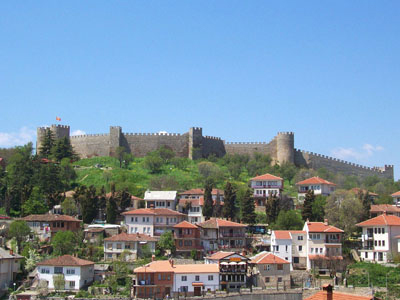Information
One of the deepest lakes on the planet, with a dazzling Unesco World Heritage site of ancient dwellings rising high above its shores, Lake Ohrid in Macedonia is a local vacation star poised for greater international acclaim.
In the tiered, terra-cotta-roofed city of Ohrid, 18 miles from the Albanian border, a lakefront settlement dating back to Neolithic times, Macedonians boast that on their side of the lake is a church, monastery or mosque for every day of the year, each full of resplendent frescoes, mosaics and icons. Notable attractions include the recently renovated church of St. Clement and St. Panteleimon at Plaosnik, an epic Byzantine masterpiece, and the 13th-century St. John of Kaneo, a limestone and brick monastery that juts out over transparent blue waters.
An estimated $50 million renovation of the Ohrid Airport is planned for 2010, with more international flights expected by summer, and up to six new luxury hotels are in the works, including a $33 million property with construction scheduled to begin in March. Tourist attractions on Ohrid's beaches were upgraded last year with swank bars and dining spots complimented by bamboo and leather couchettes, with the hot spot Cuba Libre (www.cubalibreohrid.com) leading the way.
Meanwhile, new government-financed archaeological digs around the lake regularly unearth treasures, like the 17 fifth-century tombs discovered last July. The find follows the 2008 opening of the Museum on Water, a re-created Bronze Age village built on stilts incorporating Ohrid artifacts.
Excerpt from NYTimes.com's The 31 Places to Go in 2010Aurthor: Dinah Spritzer
The Republic of Macedonia is a Southeast European country, north of Greece and west of Bulgaria.
Macedonians make up 66% of Macedonia's population of 2 million, Albanians 23%, and Turks, Vlach, and Serbs, the rest (1994 census).
Skopje is the capital of Macedonia with over 600,000 inhabitants.
Macedonian is the official language of the country and it is also spoken by the Macedonian minorities in Greece, Bulgaria, and Albania, and by the Macedonian Diaspora around the world.
Most of the residents are of Eastern Orthodox Christian and Muslim faith, while some are Roman Catholic or Protestant.
The State symbol is a golden sun symbolizing the freedom of the country and its people.
The Independence day, September 8th, is Macedonia's national holiday.
Macedonia is known for hospitality, rich culture and history, and love for good wine and great traditional food.
It is also the legendary land of Alexander the Great and the birthplace of Slavonic literacy and literature.
Information from macedonia.org photo credit:
photo credit:  photo credit:
photo credit: 
